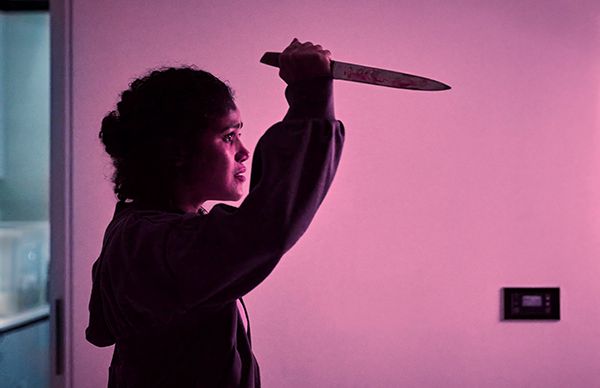Eye For Film >> Movies >> 7 Keys (2024) Film Review
7 Keys
Reviewed by: Jennie Kermode

Reading the plotlines for Seven Keys, one might imagine it being a very straightforward thriller – perhaps one of those whose command of tension stems primarily from the paralysing fear of social awkwardness that many viewers will feel at the thought of being caught in somebody else’s house. From its very first scene, however, it defies expectations, and it evolves into something much more complex: in part a modern rendering of an old French folk tale, in part a portrait of London as a city in which human beings sometimes seem to mean nothing at all.
Lena (Emma McDonald) is adrift in a mostly empty flat when we meet her, holding her emotions in check just long enough to reassure a seven-year-old boy that everything is going to be okay as he is taken away from her. She recalls an account she once saw in the news of an old woman secretly living in someone else’s house, in Japan, for a year; and imagining herself in that position, she wonders, “What if no-one found me? What if I was so lost, so small that no-one ever knew if I was there?” It’s a powerful opening which colours the rest of the film, speaking to thousands of tragedies beyond her own – a measure of real life horror which can’t be overcome with a few decisive actions, like most of what we see at Frightfest, but has to be endured.
At least, so we used to think. Isn’t there supposed to be a cure for that these days? Can’t one pick up a phone and swipe one’s way out of loneliness? Lena may have next to nothing, but she can scrub up well. When she arrives at the restaurant she has a glamour about her that belies the reality of her situation. It seems to give her confidence even when her date doesn’t show. He did look very handsome, she thinks. Was she overreaching? There’s a guy, Daniel (Billy Postlethwaite), at the restaurant who seems to have been stood up too, so they get talking, and end up eating together, and it’s much more fun because it’s not a date, and she finds herself wanting more. He’s reticent, but she’s unashamedly pushy. When she follows him, she thinks she’s figured out the reason for his hesitation. He is, as they say, of no fixed abode. Well, it’s not a deal breaker. She’s been in that situation herself. She persuades herself that, despite the precarity of her own situation, she can save him. That all it really takes is courage.
Daniel still has the keys to all the apartments he’s previously lived in. Lena knows from experience that landlords hardly ever change the locks. Overcoming his fear through sheer willpower and charm, she persuades him to take her on a tour of all these places. There they can help themselves to food, take showers, watch TV, maybe even get it on, and get to know each other. He can acquire some confidence. She – well, she has something else in mind.
Contrived though it might sound, this story develops easily, organically, thanks to the performances and Joy Wilkinson’s cleverly written dialogue. Behind door number three, however, something unexpected happens, and that’s where the film will begin to divide audiences, some staying with it and others not. On the one hand, it means we’re not stuck with a repetitive plot. On the other, it means that there’s less focus on nuanced social factors, and it gradually turns into something much more routine, before making uncomfortable compromises with its ending.
McDonald is excellent. She has enough charisma and delivers enough bravado to convince as somebody who could talk a stranger into embarking on a daring adventure, but also shows us the pain and disappointment that Lena is trying to repress. It’s frustrating that the film gives her less and less opportunity to shine in this way. Its shift of gears takes us into a space with interesting literary influences, but it doesn’t seem to know what to do when it gets there, and the ending feels clumsy and out of place. It’s a shame because the early work is promising. Still, Wilkinson succeeds in making some important points, and in making room for voices too seldom heard.
Reviewed on: 24 Aug 2024














